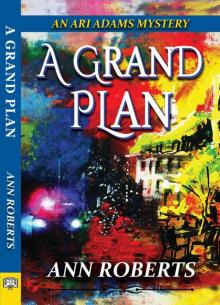- Home
- Ann Roberts
A Grand Plan Page 6
A Grand Plan Read online
Page 6
She stepped in front of the young butch dressed in saggy jeans, an oversized T-shirt and backward baseball cap.
“Think you’re one of the guys?”
She towered over her and the butch’s gaze struggled to remain on her face, the tempting allure of Jane’s heaving bosom demanding attention.
She shook her head and mouthed, “No.”
Jane thrust the dildo under her chin. Her eyes grew wide as Jane planted a kiss on her lips. “Good. I don’t kiss boys.”
The teens scurried across the street to escape the predatory S and M vixen with the dildo. Jane and Ari shared a laugh before they merged with the westbound traffic.
Further ahead she glimpsed the back wall of the Canvas Restaurant, a mural of an octopus swirling in a rainbow sea with fish and lobster. The style was reminiscent of a cartoon Disney movie. A series of multicolored bicycles dipped in orange, lime-green and baby blue paint fenced the property and kept the thousands of First Friday goers from trampling on the desert plants that surrounded the eatery. Customers enjoyed craft beer on the covered patio, soaking in RoRo’s nexus, Third Street and Roosevelt.
They waited at the stoplight, shoulder to shoulder with dozens of other people clustered in their pockets of familiarity. No two groups were alike, and she marveled that First Friday was the type of event that appealed to anyone interested in seeing or being a spectacle. Jane was certainly confirmation of that fact.
Flyers covered the streetlight poles announcing concerts of underground bands, blatant offerings of illegal substances for sale and upcoming parties and events in RoRo. The sidewalk was as good a place as any to make a declaration, and scrawled under their feet in yellow chalk were the words PHX PD STOP HARRASSING TRANS WOMEN!
Across the street two identical nine-story towers shot into the sky, a combination of steel and tan concrete. The architect had done everything possible to merge the structure with the desert landscape given that a high-rise would never aesthetically fit with a hundred-year-old neighborhood.
“What do you know about that place?”
Jane glanced at the apartments and flicked some invisible lint from her skirt. A real estate agent like Ari, she was the queen of industry gossip. “I know it’s half empty. The developer is a guy named Sebastian King, and he designed it like those trendy New York boutique hotels. He’s also a member of the First Friday Council.”
“I’ve heard of him, but I’m surprised he’s involved in anything this upscale. He owns several of the properties west of RoRo. He’s a slumlord and if he’s on the council, he’s now a suspect in Molly’s investigation.”
“Now, Ari,” she chided. “No one wants to be called a slumlord.” She batted her fake two-inch eyelashes for effect. “He brought in some investors including an Egyptian company. One of the employees told me he hoped to cater to the young single people who want an urban living experience and the parents of downtown ASU students who don’t want their little Tiffanies and Jennifers to suffer in a dorm setting. Half of the floors are designed so three or four people can share common living spaces but each tenant has a bedroom.”
“Sounds like a good concept. But you say it’s half empty?”
She nodded. “Trendiness is pricey and there’s only thirty percent occupancy, according to my source. His rents are too high.”
Their progress halted momentarily in front of greenHaus as a large group spilled from the emerald-colored building. A slight breeze snaked through the crowd and offered temporary relief from the baking heat. Ari resisted the urge to dart into the eclectic store and buy some Slap, her favorite locally made soap.
She followed Jane past the primary-colored MonOrchid Gallery to the What Should Go Here Pop Up Park. Situated at the northeast corner of Second Street and Roosevelt, a rock path framed a patch of luscious green grass. Awnings provided ample shade for picnic tables packed with teens and families enjoying their meals from the food trucks. Children played tag, dodging the adults sprawled on the grass in various states of relaxation or amorous connection. The current life-size art display was a winding tunnel configured of curving blue boards. Children squealed and laughed as they zipped through the maze or darted between the boards while their parents rested on the built-in benches.
Shouts drifted above the hum of the crowd and Ari searched for the source. At the corner a skinny young man held a clipboard and confronted an older man. A small crowd had formed around them, eager to watch the show.
“You druggies are ruining America!” the white-haired man shouted.
“Pot has never ruined anyone!” the younger man screamed back. Ari guessed the clipboard held a petition to legalize marijuana.
Molly’s Segway zipped between them and Ari stared at her fabulous figure.
As if reading her thoughts, or perhaps just noticing that her tongue was wagging, Jane said, “She looks good, huh?”
“She does.”
The crowd broke up when the older man walked away, deferring to his wisdom and maturity. The young man nodded as Molly whispered in his ear. Ari imagined she was reminding him of the city ordinances governing peaceful assembly.
He resumed his petitioning, and when Molly saw Ari, she offered a shy smile. “Hi.” She looked at Jane. “This is lust, huh?”
“You betcha, baby.” Jane turned in a circle, attracting the stares of every nearby male and disapproving smirks from most of the females.
“How’s everything going so far?” Ari asked.
Molly’s gaze returned to the crowd. “So far everything seems to be okay, but it was quiet two weeks ago until it wasn’t. Then all hell broke loose. That can’t happen again.”
A coiled wire trailed underneath Molly’s curls and ended at the radio affixed to her belt, connecting her to the other four members of Nelson Security.
Ari gently touched her arm. “You got this.”
The worry fell from her face and her crystal-blue eyes held Ari’s gaze. “Thanks,” she whispered.
“I’m heading down to LGA. I want to see what First Friday looks like on Grand.”
“Seamus and Leon are down there,” Molly said, referring to two members of her security team.
“All right, we gotta catch the trolley,” Jane announced. She looked at Molly and added, “Can you believe I let her talk me into riding that thing?”
Molly chuckled. “It will be fun, Jane, and probably entertaining for everyone else on board.” She turned to Ari and said, “I’ll call you tomorrow.”
Ari automatically smiled. Jane laughed and pulled her away. “You two are so funny.”
They crossed Second Street and pressed forward through the thick crowd surrounding The Flea Market, a vacant lot where vendors could throw up a tent and sell anything. Hundreds of people jostled through the makeshift aisles, perusing the ceramics, crystals, jewelry and leather crafts.
They joined the trolley group: two beatniks with purple hair, a couple with tattoo sleeves and facial piercings and an ex-hippie wearing bell-bottoms and a Free Tibet T-shirt. The ex-hippie studied the cover of an old Ramones LP that Ari imagined he’d just purchased at Revolver Records. No one seemed to care that Jane was dressed like a prostitute and carrying a dildo.
As they boarded the trolley headed for LGA, an older gentleman holding a microphone greeted them. He wore a nametag that identified him as Steve, a First Friday volunteer. She imagined he would regale them with historical tidbits during the ride.
Since it was already crowded, they were forced to separate. Jane took an iron-framed wooden seat in the front while Ari headed past the glass partition and found the last open spot in the back row next to the face-pierced couple. She’d never been on the trolley but she realized it was actually a large van with all the contemporary bells and whistles.
The ride provided a respite from Jane’s small talk and her thoughts drifted to Molly. They’d gone to lunch last November after Molly had shown up in her backyard while she was gardening, but then they’d lost touch in the frenzy of the holidays. One
lunch had not built enough momentum to rekindle a relationship of any kind, and it had been so awkward, including a trip to the parking lot to return each other’s personal possessions from their breakup.
Then one Sunday a client had suddenly canceled and she’d gone to a matinee at the historic Orpheum theater. She’d run into Molly and the friendship had reignited.
Now Molly needed her help to find Ms. Wonders’s killer. When they collaborated on a case, they worked as a couple. Molly’s self-esteem issues rarely surfaced when she was playing detective. She knew she was Ari’s equal. It had been the rest of their life that had been the problem. She’d never felt good enough for Ari, a secret she’d finally admitted a few weeks before.
She glanced over at Jane who mouthed, “What’s wrong?”
She shook her head and focused on the ride west to LGA. They crossed Central Avenue, which divided RoRo from the Roosevelt Historic District, a stately residential neighborhood whose commercial property licenses were limited strictly to Roosevelt Street. The one-and two-story craftsman bungalows from the nineteen twenties once belonged to prominent families and now housed well-known accounting and law firms. Palm trees lined sidewalks that were often filled with joggers, couples with baby carriages or well-dressed business people out for a stroll on their lunch hour. She’d sold a few houses in Roosevelt and had considered purchasing one for herself.
They stopped at the Seventh Avenue light, the boundary between Roosevelt and the less affluent F. Q. Story Historic Neighborhood. While many of the homes in the heart of Story were quaint and charming, those on Roosevelt sat on the fringes, butting up against I-10. A flashing bail bonds sign foreshadowed the changing landscape. Tiny brick and block homes outnumbered the decaying apartments and duplexes that had originally housed the blue-collar workers of the pre-World War Two heyday. Three-foot chain-link fences surrounded many of the occupied properties, providing little security but ensuring pets and small children didn’t wander onto busy Roosevelt. As the trolley rumbled past an old Monte Carlo, she caught sight of two men engaged in some sort of an exchange, their palms quickly touching and disappearing into their respective front pockets.
The depressing landscape, devoid of the green and lush manicured lawns found in Roosevelt, shifted near Twelfth Avenue courtesy of artists’ brushes. An entire apartment complex painted sky blue and covered in murals announced it was “Powered by GLIDDEN.” Primary colored exteriors and unique lawn sculptures foretold the shift that was literally around the corner.
They had stopped at the intersection of Grand, Roosevelt and Fifteenth Avenue, and Steve had ample opportunity to continue as five other directions of waiting motorists took their turns to cross Grand.
Steve cleared his throat and said, “Welcome, everybody. As we approach Lower Grand Avenue, let me give you a little history. Grand is also known as U.S. 60, and prior to the completion of I-10 it was the artery to California with motor court motels dotting the roadside.” He pointed through the windshield. “The Bali Hi was one of the most famous. During the fifties and sixties it was a frequent stop for celebrities because it had a beautiful heated pool.
“But the interstate ended Grand Avenue’s commercial prosperity. As the stores, motels and shops dwindled, industrial complexes took advantage of the expansive acreage available. Companies like Wickham Paper and Pulp Mill, Homer Ironworks and AM Tool and Dye bought the land near the tracks. For many years now Grand has been an eyesore and a bother to motorists, but all of that may be changing. The six mayors who govern the municipalities along Grand are working to rejuvenate it, and this area, LGA, hopes to rise out of the ashes like the legendary phoenix bird and become a second successful artists’ community.”
Most of the trolley riders cheered, and from the passion in his voice, Ari could tell Steve was very much in favor of LGA’s success, a feeling she knew was not shared by everyone with an interest in the area.
Lorraine had told her about the fighting that occurred amongst the First Friday Council members, half of whom believed LGA’s success would greatly cut into RoRo’s hard-earned prosperity. It took RoRo nearly twenty years to gain credibility, and some members believed it should take LGA at least that long. Some were secretly gloating that LGA was experiencing a crime spree—until the gang knifing at the park.
The trolley swung wide onto Grand and she took a deep breath, the image of her brother on his bicycle flooding her brain.
She peered through the window at the four decrepit buildings that comprised the Bali Hi. The trolley slowed, passing the Frontal Lobe Gallery and stopping in front of Brown’s Diner. She immediately noticed the four by eight plywood sheets that covered the broken picture window. She hated vandalism, but the crime spree was the reason Molly’s new company had its first big contract.
By the time she stepped off the trolley, Jane was chatting up a straight couple about her dildo. She checked her watch. Jane’s performance was still forty-five minutes away and Ari wanted to check out the area. She waved goodbye to Jane and headed toward Seventh Avenue. Few businesses were part of First or Third Friday, and most closed at five p.m. She passed Arizona Patio Furniture and Grand Avenue Garage. Many of the stucco buildings were uninteresting and had no signage at all, as if their owners didn’t want anyone to know what went on inside. The energy never stopped on RoRo, but LGA seemed conflicted, fighting for its identity.
Four teenagers strolled past her on their way to the diner, clearly unafraid for their safety, but a block later an older couple, each wearing a grimace, hurried by as if they couldn’t get off LGA fast enough. As she approached the Stapley building she saw only the shadows and what might lurk there.
Across the street an inviting light glowed over the patio at Scrabble. She crossed the street and peered through the fence at the brightly colored cottages painted red, yellow, royal blue and lime green. The uniqueness of the space was unmatched. The patio was tiered, allowing for different seating levels and providing a view of the stage in the front. Large planters full of trees and flowers added color and balanced the industrial look of the concrete. A rock garden filled with cacti and cairn sculptures bordered the exterior fence, deterring trespassers. Most of them had remained intact although a few had toppled over. Some were merely rocks piled one on top of another, while others were true sculptures of animals and people with a wire frame holding the stones together. She resisted the urge to reassemble the toppled ones. The two-story Scrabble structure sat in front, like a sentry protecting and hiding the treasure behind it.
She glanced over at the Stapley building. Would it be crazy to invest in two businesses on LGA? Her financial planner would probably advise against pouring her hefty nest egg into such a questionable area, but she knew if the deals fizzled and the money was lost, she’d still be okay. It wasn’t like she was retiring any time soon.
The woman with blue bangs, Chynna Grove, emerged from the front building. She grabbed a hose and started watering the planters. When she noticed Ari staring through the fence she said, “Can I help you?”
“You have a really cool place here.”
“Thanks,” she replied, as if people told her that all the time. She pulled the hose to the next planter and ignored Ari.
“I’d really like to see the inside.”
Chynna glared at her. “Do you have money to buy? If you’re somebody that actually has some cash, I’m happy to spend time with you, but if you’re just a looky-loo who thinks these little cottages are adorable, I’m too busy to be a tour guide.”
“I have money,” Ari replied, hoping she didn’t sound pompous. She pulled out her business card and stuck it through the wrought-iron bars. “I’m Ari Adams.”
Chynna turned off the hose and came to the fence. Up close Ari could see she was older than she appeared from a distance, despite her hair color. Still clinging to the trappings of youth, she wore a peasant blouse and skinny jeans. She held the card up to catch a glimmer of light to read by, and her expression softened.
�
��You work for Southwest? That means you work with Lorraine Gonzales.”
“I do,” she admitted slowly.
“Lorraine and Tony. Only honest people on that whole damn council. The rest of them are turds.”
“Why do you say that?”
“It’s a long story, but if you’re a potential buyer, you should at least know some of it.”
Chapter Six
Ari followed the fence to the industrial double front doors where Chynna waited. Inside were the skeletal remains of the coffeehouse. Butcher-block tables were haphazardly scattered throughout the space and three broken chairs were stacked against a wall. A pipe jutted from a corner, suggesting the location of the prep area. Ari envisioned the layout. A sheet of dust covered everything, including the interesting design on the concrete floor, an enormous Scrabble game that stretched from wall to wall. Ari realized she was currently standing on the bisecting words horse and corpse, and she automatically took a step to the left.
“I wouldn’t set your purse down or lean against anything. I bought this place four years ago, took two years to create the vision and fourteen months to watch it die. That’s pretty much the story,” she said bitterly. She made a sweeping gesture. “This was Scrabble. I had several little catchy gimmicks that I won’t bore you with. I sold off the equipment so if you decide to re-open a food or beverage joint, which I would definitely advise against doing, you’ll need to start from scratch.”
“Why would you advise against another coffeehouse or a restaurant?”
She looked her straight in the eye and said, “You’ll never win.”
“Against who?”
“The Browns. They own the diner down the street and they’ve been here forever. They’ll make sure nobody helps you out if your place competes with them in any way.”
They proceeded into a spacious back storage area with great shelving and cabinets. Ari looked closely and asked, “Are these handmade?”

 Screen Kiss
Screen Kiss Deadly Intersections
Deadly Intersections Paid in Full
Paid in Full Point of Betrayal
Point of Betrayal Hidden Hearts
Hidden Hearts Ann Roberts - Paid in Full
Ann Roberts - Paid in Full A Grand Plan
A Grand Plan